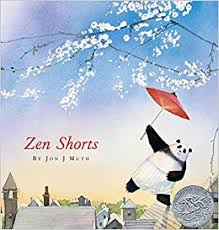Zen Shorts, and Other Wisdoms
Listen to the Recess! Clip
| Author | John Cech |
| Air Date | 12/15/2005 |

Zen Shorts, and Other Wisdoms Transcript
This year, for presents, I’m giving wisdom. Not my own, mind you. I’m not at all sure how much of that I have. But rather in the form of some picture books, like Hugh Upton’s retellings of a group of folktales in Tales of Wisdom and Wonder. There’s the Haitian story about the little monkey who finds his first taste of misery to be surprisingly sweet, and asks Papa God to oblige him and give him his fill — a request the monkey soon regrets. In the Native American Cree story, “The Curing Fox,” a child is desperately ill, and her father is sent by the wise healer of the tribe to find a she fox and bring the creature back for the little girl. The journey eventually leads not only to the child’s recovery but, unexpectedly, to the curing of the father’s worry. But perhaps the best of the group is about a blind man who teaches a hunter, who is hopelessly inept, the importance of “see[ing] with [one’s] ears and hear[ing] with [ones] heart.”
This year Demi offers a fable, The Greatest Power, which is set in ancient China. It’s about a challenge that the young emperor gives to the children of the kingdom to discover what is “the greatest power in the world.” Some children think it must be weapons, others opt for inventions of every kind And then there’s little Sing who holds in her palm, one tiny lotus seed.
But the wisest book of all this year is a collection of tales called Zen Shorts from Jon J. Muth. One day, three children — Addy, Michael, and Karl — are surprised by the appearance outside of a giant panda bear. “I’m sorry for arriving unannounced,” he tells the children. “The wind carried my umbrella all the way from my backyard to your backyard. I thought I would retrieve it before it became a nuisance.” The name of the bear is Stillwater. You get where this is going. For the next three days, each of the children goes to visit Stillwater, and during their visits, he tells each of the children a story. Addy’s is about how Stillwater’s Uncle Ry once caught a burglar breaking into his house, but, instead of attacking him, Uncle Ry gave the robber the only thing he could: his tattered robe. He’d wanted to give the burglar the beautiful moon, but he couldn’t reach it. Michael’s story describes a farmer, his lost horse, and his good and bad luck. In the end, the farmer explains, you can never really be certain what kind of fortune events may be bringing you. Stillwater’s tale for Karl is about setting burdens down, rather than carrying them with you throughout your life. Each of these zen koans, or teaching stories, is a perfect fit for the individual child and his or her concerns. You can never have enough wisdom, and, as these authors and illustrators are showing us in the beautiful meditations of their books, you can never begin too early.